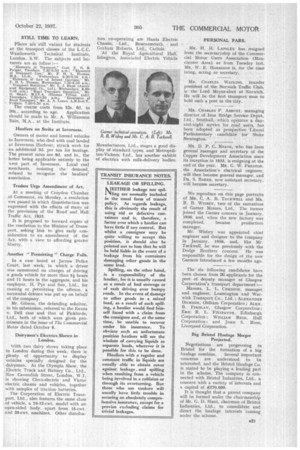TRANSIT INSURANCE NOTES. LEAKAGE OR SPILLING.
Page 55

If you've noticed an error in this article please click here to report it so we can fix it.
MEITHER leakage nor spa.
hug are normally included in the usual form of transit policy. As regards leakage, this is obviously the result of using old or defective containers and is, therefore, a factor over which a haulier can have little if any control. But whilst a consignor may be quite willing to accept this position, it should also be pointed out to him that he will be held liable in the event of a leakage from his containers damaging other goods in the same load.
Spilling, on the other hand, is a responsibility of the haulier, for it is usually caused as a result of bad stowage or of rash driving over bumpy roads. In the event of damage to other goods in a mixed load, as a result of such spilling, a haulier would find himself faced with a claim from the consignor and, at the same time, be unable to recover under his insurance. To obviate such an unfortunate position hauliers will see the wisdom of carrying liquids as separate loads, wherever it is possible for this to be done.
Haulier with a regular and constant traffic in liquids are usually able to obtain cover against leakage and spilling when resulting from a vehicle being involved in a collision or through its overturning. But those who use tankers will usually have little trouble in securing an absolutely comprehensive insurance, except for a proviso excluding claims for trivial leakages.
























































































































